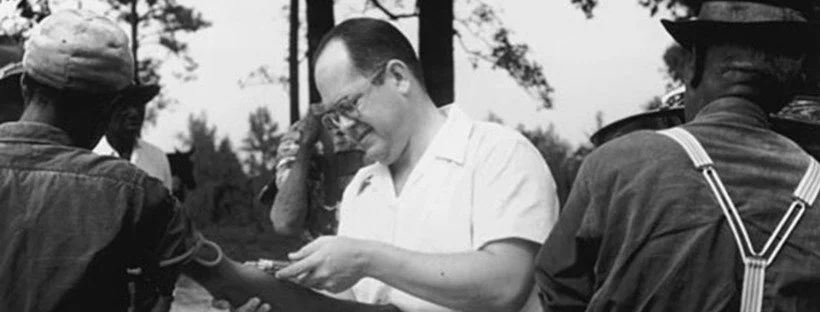Bringing Awareness to the Tuskegee Syphilis Study
By: Yewon Lee
The year is 1932. A young African American man is promised free yearly medical checkups, monetary burial compensation, and hot meals in exchange for his participation in a study by the Tuskegee Institute (today’s Tuskegee University). Having little money and illiterate, he is quick to register for the study unknowing of the details of what that would entail. Even after being diagnosed with syphilis, he is not told about his diagnosis in hopes for researchers to study the long lasting effects of the disease. When left untreated, the sexually transmitted disease can have life-long consequences of damage to the brain, heart, and eyes, and during the length of the 40 year study, penicillin is discovered to be an effective treatment for syphilis. Yet, physicians, deliberately hiding this information, do not treat the man, further spreading the disease to his wife and children.
In Macon County, Alabama, 600 black men were enrolled in the Tuskegee Syphilis Study, 399 of whom already had the condition, but doctors from the US Public Health Service, PHS, refused to treat the men even after penicillin was identified as a medication in the 1940’s. The study continued until the 1970’s as 128 people had died from the disease or complications of the disease, and over 40 women were infected through syphilis transmission. The PHS review board had actually decided to study the men until all of them had died, and it was not until a leaked story to Jean Heller, journalist for the Associated Press had reported on the unethical, heinous act of experimentation on African Americans.
The Tuskegee Syphilis Study changed the way research is done with human participants. From strict codes of informed consent to institutional review boards to the National Research Act, the horror of the study left an impact on the full knowledge of all research participants of all the details of a research method, including results and potential risks. And although researchers claimed that the participants had agreed fully to the Tuskegee Study, most of these men were poor sharecroppers and often illiterate. With the promise of free medical care and meals, they were essentially manipulated into signing up for the study without full knowledge of their own diagnosis or any treatment options throughout the entire 40 years of the study.
After the manipulation and atrocious acts by the PHS was revealed to the public and black communities, many African Americans started to lose their trust in the American medical system and mainstream healthcare, including vaccines, medications, new treatments, and information on the more recent AIDS/HIV epidemic, etc.
Like any other issue, awareness and education is key to change. Despite being a significant event in medicine, science, and bioethics; despite the lasting impacts on the black community; despite living in the state in which it occurred, I had never heard of the study until just last year. But it did spark a motivation in me to write, talk to others, and overall, just raise awareness on the issue to ensure that people know about the implications of the heinous details in the study. To find out that scientific research to the magnitude that human lives would be sacrificed, manipulated, and lied to, deeply affected me, as a student currently interested in pursuing STEM and research throughout college and as a person.
To learn more:
